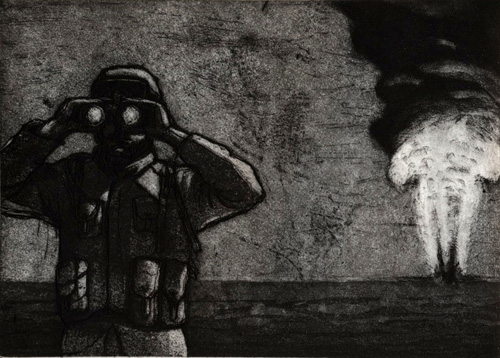 I am hiding behind the front seat of my mother’s Rambler with my cousin Nancy, because my father has come out of the house. He is standing on the porch by the kitchen door in his underwear, looking around. It is the middle of the afternoon.
I am hiding behind the front seat of my mother’s Rambler with my cousin Nancy, because my father has come out of the house. He is standing on the porch by the kitchen door in his underwear, looking around. It is the middle of the afternoon.
The last thing I want is to be seen by my father. I am nine, have mastered invisibility: I disappear behind sofas, under beds, into closets, among the folds of curtains, up into trees where I hide among the leaves for hours at a time.
Barely breathing under the covers at night, I smooth the quilts above me to make myself flat, to make the bed look empty. I never know how successful the illusion is but I believe in its efficacy, and it soothes me.
Nancy hides with me, because she understands the danger. She comes over because being at my house is a relief from being at her own. Her daddy gets drunk and beats up her mother every few days.
We often crouch together in the secret, spitty, mud-smelling way of children. Around us, the grownups are distracted nearly to death by fists and arguments, by whiskey and bruised faces, whispered conversations.
In moments of calm we play. The neighbor kids have their own tarnishy, shadowy lives. None of us knows anything else is possible.
Blankets over clotheslines are houses, stacked boxes a jail, bamboo canes from the spidery thicket where snakes are reputed to live can be anything. We tear skin off our grimy knees, pick at our scabs.
Through open windows information floats out to us: Laughter, screams, cigarette smoke, the tinkle of ice, slam; chicken frying, shouts, music; the suck and whoosh of beer cans opening, the grease and sweat of our fathers’ clothes.
We throw ourselves on thin rugs, suck pilfered Cokes, watch TV.
That evening my father drives away in his old yellow truck, and I hope to be told that he’s run off the road and been killed. Waiting for the sputtering crackle of tires on gravel is unbearable, escape unimaginable.
I want to die, but I don’t know how. I lock myself in the bedroom, refuse to come out. My mother doesn’t think this is as strange as she should. We have backed away from each other like tortured rats into the corners of a cage.
I want my father to die because I’m afraid of him. A few nights later I wake to the sound of my father putting his fist through glass. My mother and I flee for Texas like refugees from a war.
On the way out of town, just before dawn, we drop our dog off at the pound. She is older than me, with dirty, matted hair, and sad, rheumy eyes. I watch her—confused, shivering, small—slide down a ramp into a barking, swirling mass of dogs.
I watch out the back car window the whole way for my father’s truck, terrified that he will come after us, but feeling something oddly like sad when he doesn’t.
I wake night after night all that fall, in paroxysms of grief and regret, weeping over my old dog. My mother, stunned and useless, tells me to go back to sleep.
I feel safe for the first time in my life, there among my cheerful, constantly cooking aunts, my kind and silent uncles, my many raucous and unworried cousins. I am the quiet one.
My mother whips me and gets a piece of lead stuck in her palm from the pencil I’m holding in my hand. Its mark stays there like a tiny tattoo for the rest of her days.
In January, just after the Christmas holiday from school is over, my father puts a pistol to his head and does the thing I’d waited and wished for. My big brother calls to tell us.
I am the one family member not mentioned in his suicide note. I succeeded at being invisible after all. My mother and I fly home, move back into our house, as if nothing happened.
I go back to my school, where a boy named Dutch asks me how big the hole in my father’s head was. I tell him I don’t know. Secretly, I am curious too.
Life is quiet; slack. I get a new dog.
My mother drives me to the library once a week.
It’s the one good thing she ever does for me.
Luke St. John’s writing has appeared in The Sun, Clean Sheets, The Prairie Flame, and–most recently–in scissors and spackle. His stories have been anthologized in Skin Deep, Lip Service, and Pillow Talk II, all published by Alyson Books. He lives in Sacramento, California with his cat, Steinbeck, and is working on a novel.
Illustration by Marc Snyder

8 comments
Justin Brouckaert says:
May 16, 2012
Fantastic.
natalie says:
Jun 7, 2012
Beautiful
Brandi Nunez says:
Jun 11, 2012
Wow.
Cyndi says:
Aug 4, 2012
Brave! Stunning!
Gwynn says:
Sep 6, 2012
Powerful.
Melanie says:
Sep 8, 2012
Haunting and powerful. “It’s the one good thing she ever did for me.”
Yvonne M. Sode says:
Sep 16, 2012
Unfortunately I remember and wasn’t able to hide from it. Touching story.
Barnstorm » Blog Archive » Nonfiction Pizza Party says:
Oct 30, 2012
[…] previous setup. The 16 essays in the latest issue are tongue-in-cheek, lyrical, minimalist, and heartbreaking. The issue’s best metaphor is even better out of context: “He was a teddy bear crammed into a […]